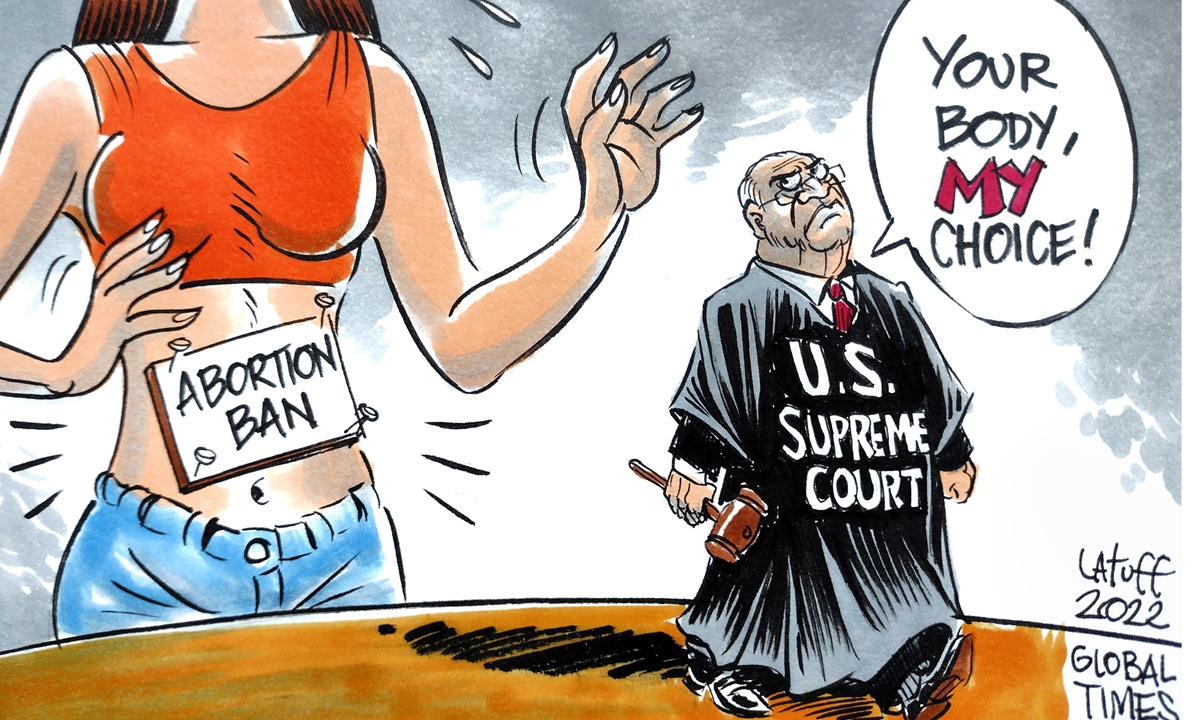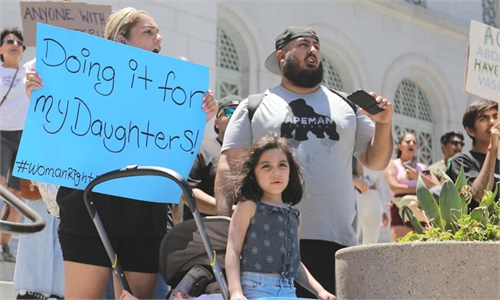
Illustration: Carlos Latuff
After an ideologically divided US Supreme Court reversed Roe v Wade - a decision almost 50 years old, under which unrestricted abortion was considered a constitutional right - riots broke out in major American cities.
Some members of Congress, such as Rep Alexandria Ocasio-Cortez (D-New York) and Senator Elizabeth Warren (D-Massachusetts), called the US Supreme Court "illegitimate," while others such as Rep Maxine Waters (D-California) said its ruling ought to be ignored.
The Dobbs decision that overturned Roe does not make abortion illegal nationwide. Instead, it returns the issue to the individual US states, which have numbered 50 since the admission of Hawaii in 1959. Those ruled by Republican majorities - colloquially known as "red" after a TV electoral map some 20 years ago coded them that way - quickly moved to activate laws that banned or severely restricted abortions. Meanwhile, several states run by Democrats - coded as "blue" - vowed to become "sanctuaries" for women from red states seeking to legally end their pregnancies.
It wasn't the only politically controversial decision the Supreme Court has made recently. A week before Dobbs, the court overruled a state law in (blue) New York that sought to restrict residents' ability to carry guns for self-defense, citing the Second Amendment of the US Constitution. The Monday after overturning Roe, the court sided with a coach who got fired for praying after games, saying this violated his First Amendment rights to freedom of religion.
All of these issues fall along partisan lines. Democrats favor legal abortions, gun control and ban on religion in the public sphere. Republicans favor religion and gun ownership and want abortions banned or at least regulated. What makes for deadlock on the federal level can often become whiplash on the state level, as "blue" governments enact their own policies only for the "reds" to reverse them if and when they retake power - as was the case in Virginia last year - and vice versa.
Democrats are now arguing that Supreme Court's decisions were made by unelected judges, thwarting the "will of the people" - i.e. their voters, who supposedly gave them absolute majorities on every level of the federal government in 2020. Party strategist David Axelrod argued on Twitter that Republicans are a minority "gaming the system to promote a radical agenda that flouts the will of the majority under the guise of constitutionalism."
Republicans have fired back that sending the abortion issue back to the states was "one of the most democratic things the Supreme Court could have done on the issue," calling the states "laboratories of democracy." One conservative critic directly replied to Axelrod, pointing out that Roe was actually a decision by unelected judges pursuing "social justice jurisprudence" and that for years Democrats approved of it.
For an outside observer, the notion that red and blue states can enact drastically different policies and even openly disagree with the federal government may seem absurd, a flaw of democracy that fuels extremism and instability. From the standpoint of those who call the US "our democracy," it is indeed a weakness and problem. Yet those who still believe the US is a federal republic consider it a strength and believe that such an adversarial arrangement - perhaps a bit more moderate, anyway - has enabled this political system to persevere for almost 250 years.
When the original 13 colonies successfully seceded from Britain, they were recognized as independent states. For about five years before the Constitution was written to establish "a more perfect union," they coexisted uneasily under the Articles of Confederation that saw them clash over many issues. On two occasions, groups of states threatened to secede from the union over a policy dispute: New England almost did so over the embargo against Britain during the 1812-15 war, and the South actually declared independence in 1861, only to be defeated on the battlefield in 1865. To this day, there is no legal ruling on whether states are allowed to secede - only the precedent established by force of arms.
Abraham Lincoln, the president who won that war, famously said that "a house divided against itself cannot stand." Yet here is the US, once again divided - not regionally, but politically; this time between the Blues and the Reds - and with talk of civil war on some lips, 157 years since the last one. It's ironic, especially when considering the US has been trying for decades to impose its own political system around the world - often at gunpoint - as the only proper one.
Advocates of federalism say that it's the only way to keep such a large, diverse country - ethnically, religiously, racially and yes, politically - together in peace.
The author is a Serbian-American journalist. opinion@globaltimes.com.cn

